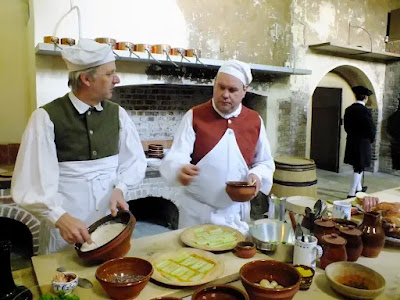 |
| Food historians Marc Meltonville and Robert Hoare |
Two intriguing aspects of Georgian life are being examined this month as the Handel Hendrix House is bringing Georgian food demonstrations to Handel’s kitchen, whilst at the Foundling Museum, A Queer Georgian Social Season launches its 2024/25 season with Queen Christina’s Queer Cabal: Handel & Corelli.
As part of the recent restoration of Handel’s house, which included returning the lower floors to their original layout, the kitchen’s were recreated. Whilst we call this Handel’s kitchen, of course it would have been the domain of his cook. And on 28 and 29 September 2024, as Simon Daniels, director of Handel Hendrix House explains: “Food historians Marc Meltonville and Robert Hoare will be in period costume and using replica Georgian kitchenware. For the first time since the house’s £3million restoration, visitors will be able to experience a kitchen filled with the sights and smells of Georgian cooking using recipes from the 1747 cookbook The Art of Cookery Made Plain and Easy by Hannah Glasse.”
Visitors will be able to watch and talk to the cooks as they prepare different dishes throughout the day as well as finding out what life was like for the cooks working in the townhouses of Georgian London. And upstairs, there will be 18th-century music performed live by professional musicians in the room in which Handel himself performed.
Full details from the Handel Hendrix House website.
At the Foundling Museum, the latest Queer Goergian Social Season launches on 19 September with Queen Christina’s Queer Cabal: Handel & Corelli featuring Peter Bugeja and his ensemble, Les Bougies Baroques, with drag artist Aphrodite 1st, violinist Sam Kennedy and mezzo-soprano Maria Schellenberg.
Variously called by her contemporaries, a lesbian, a prostitute, a hermaphrodite, and an atheist, Queen Christina of Sweden eventually settled in the Palazzo Farnese in Rome where in 1656 she opened the Accademia dell’Arcadia (‘Academy of Arcadia’) where the participants enjoyed music, theatre, and literature. Participants, Queen Christina excepted, were largely male and there is a significant amount of queer-coding around the academy. Later members of the academy were Corelli and Handel, both of whom have homo-social links at the very least. Whilst in Rome, Handel wrote cantatas for the academy, many deliberately sexually ambiguous and commissioned by men, Cardinal Ottoboni and Prince Ruspoli in particular, who were identified with the homosexual/homosocial culture of their time.
The grand opening salon concert and social will be celebrating all these links, further information from EventBrite.





